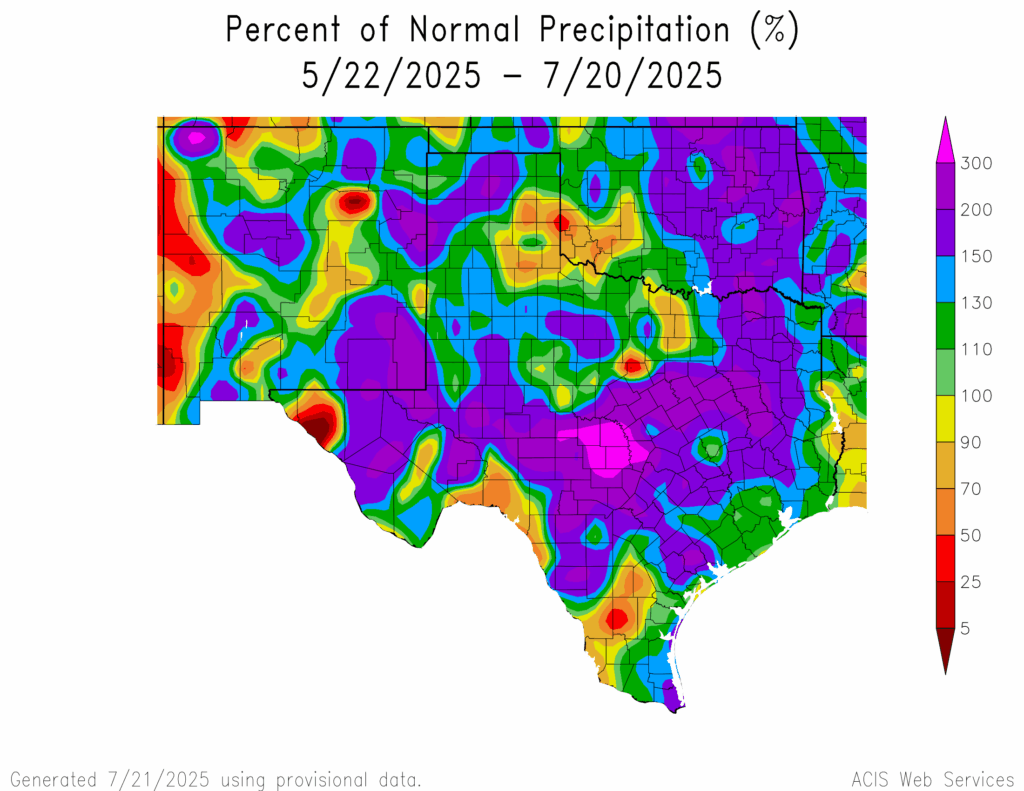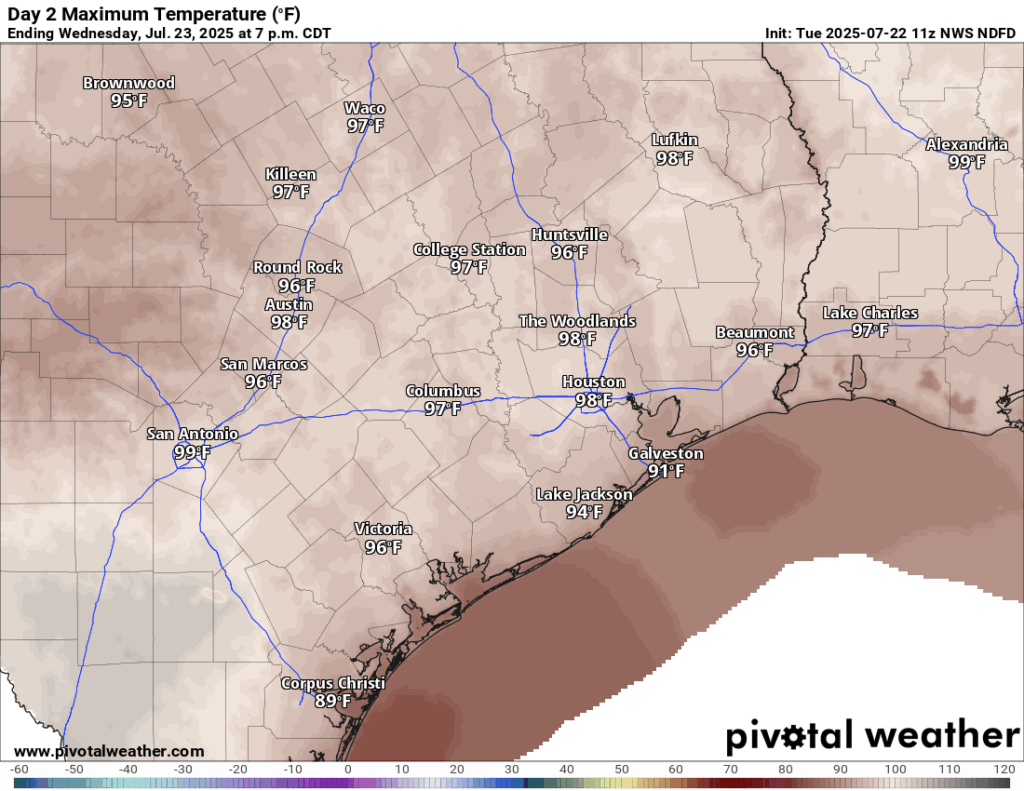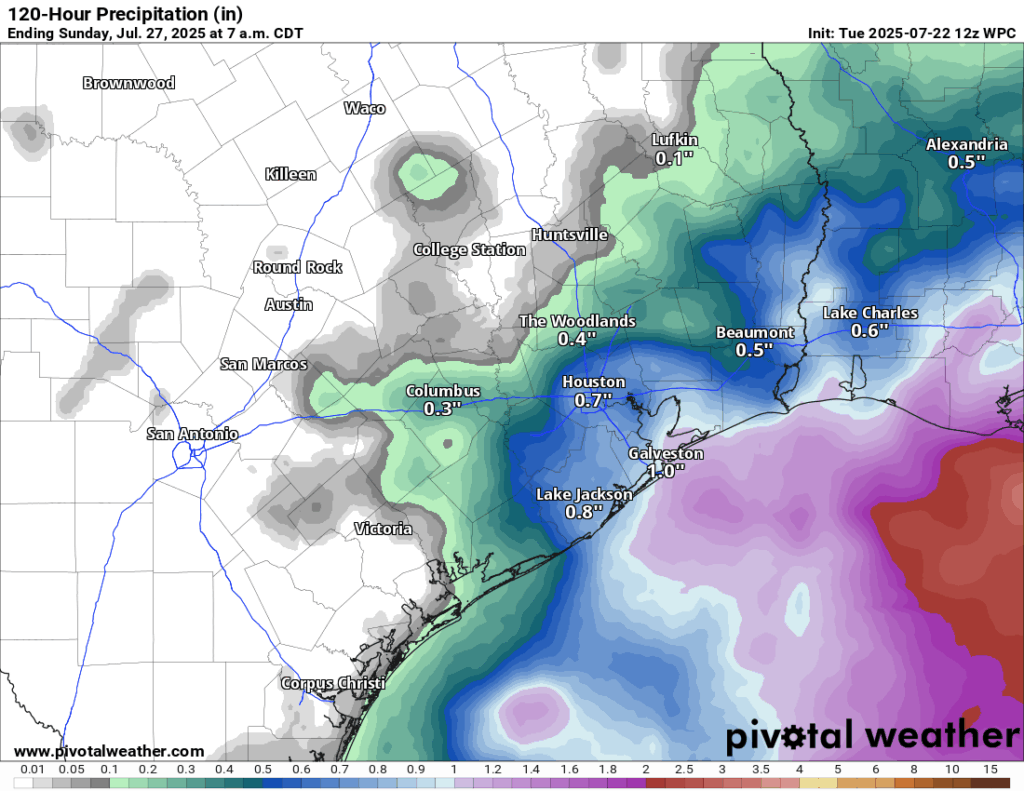In brief: After Houston’s hottest summer day so far, more heat is likely to persist today through Thursday. A tropical disturbance (that will not develop) will bring ample rain and storm chances back to the area Friday and Saturday before we jump right back into the hot stuff next week.
Summer to date in context
Since the weather is pretty cut and dry the next few days, let’s talk briefly about this summer. Officially, yesterday was our hottest day of the year, with a daily average of 89 degrees at Bush Airport, besting the 88.5° we hit 4 times, last on June 21st. But someone messaged us on Instagram recently asking if it was a pretty mild summer so far. “I’ve been able to enjoy the mornings and evenings outside which hasn’t always been the case,” they noted. And, I had to agree! It’s been hot, just as every summer is, but we’ve had enough rain chances (almost daily it seems) to break it up. It’s felt kind of like what would be a typical Houston summer.
And then Lee Corso barged in and said, “Not so fast, my friend.”
Statistically, from June 1st through Sunday, this has been the 7th hottest summer on record to date in Houston. In fact, we’re even a smidge hotter than 2024, though significantly trailing 2022 and 2023 to this point. We have averaged 84.9 degrees officially. This is about a solid 2 degrees warmer than normal. So why has it seemed less intense? In a word, the daytimes. Our daily high temperatures average 19th hottest on record. In other words, although this is one of Houston’s hottest summers on record to date, it hasn’t been that bad during the daytime. So it hasn’t seemed too intense. And on the days that it has been bad, we’ve often had rain showers to punctuate things. However, if you look at nighttime lows? It’s the 3rd warmest summer on record to date, trailing only 2022 and 2023 and only one spot ahead of 2024. Notice a pattern?

So factor it all together: Modestly hot days, punctuated by daily thunderstorms, followed by a bunch of persistently warm nights, and you get the seventh hottest summer to date in Houston that doesn’t feel all that terrible. It’s a weird outcome, but the numbers don’t lie.
Today through Thursday
Look for the heat to keep up the next 2 to 3 days. Each day will probably top off in the mid to upper 90s. I would not be the least bit surprised to see a few spots hit 100 degrees before Thursday is out. Given that this is the hottest weather we’ve had in a month and the hottest of summer, give yourself a little grace out there and take it easy, stay hydrated, check on pets, check on the elderly, and always check the backseat before you lock the car.

Friday and Saturday
The remnants of our old friend, Invest 93L are diving into the Florida Peninsula today. This system will enter the northwest Gulf on Wednesday, track west on Thursday, and it will probably come ashore between Matagorda Bay and Cameron, Louisiana on Friday. No development is expected, as wind shear is too hostile, and dry air is likely available for disruption. But, what it will do is pick up our shower and storm chances to close the week and start the weekend.

We are probably looking at a 40 to 60 percent chance of showers and storms on Friday and Saturday. This will allow high temps to plunge back into the low-90s. With enough clouds and rain, we may only make it to 90 degrees on either day in a few spots. In terms of total rainfall, it will not be uniform, as some areas will see modest amounts or little rain, while a few other locations could pick up 1 to 3 inches of rain, probably east of Houston or closer to the coast it seems right now. More on this tomorrow and Thursday.
Sunday into next week
That disturbance will exit on Sunday, lowering rain chances again. I would expect highs to return to the mid-90s by Sunday and then upper-90s at times next week, as a monster ridge of high pressure sets up over the Southern Plains. We will probably flirt with the hottest weather of summer again for much of next week.
